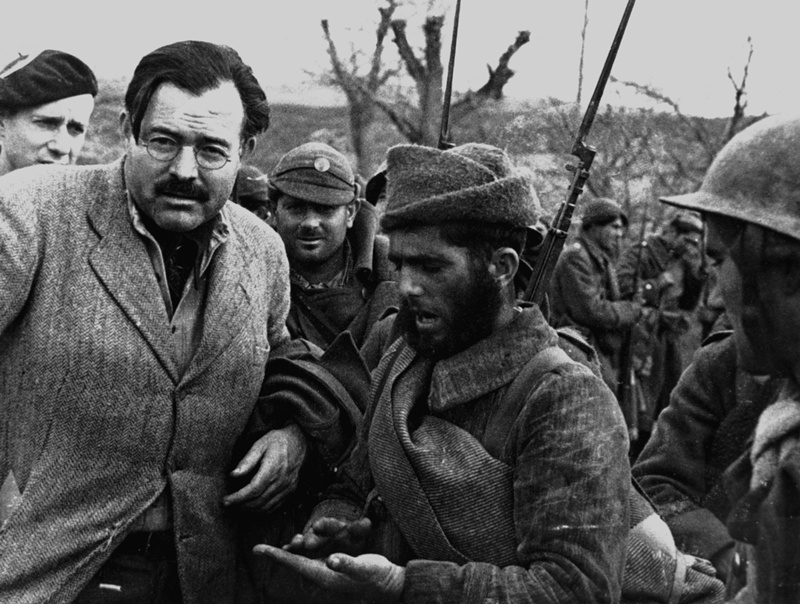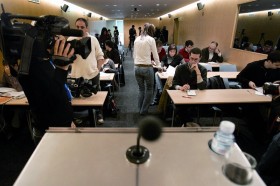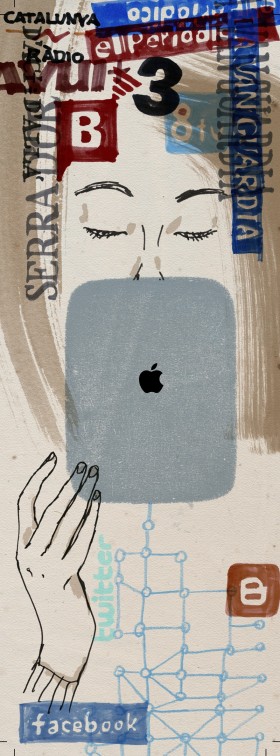–I would ask you to tell me the whole story right from the start, but you’ve forewarned me that there’s a money issue, and I charge by the hour.
–That’s right. I don’t have deep pockets. As a city, I manage; tourism keeps me going, drunk but still standing. It’s the press that worries me. It’s in crisis: not just its finances, but its identity, too. Bearing in mind that journalism is a trade plied for the greater glory of our collective memory, in the short term I think it would be appropriate and prudent to follow its lead and save myself the trouble of a longer-term view. After all, I’m proud of the past: it’s the future that worries me. They’re closing down titles, the public media organisations are shrinking, journalists are working for peanuts…
–Calm down, don’t worry. We’ll make it.
–Alright. See, the press likes to complain; it’s an essential part of its function: democratic control and all that stuff which, when all is said and done, are yesteryear’s inventions. Because a hundred years ago, most of my newspapers were extensions of political parties. Some are today, too, but despite all that, they do generally keep up appearances, don’t you think? A bit, at least.
–Stay focused, you’re going off on a tangent, and that’s not like you. It’s the press speaking through your mouth.
–Touché. I was complaining about the financial situation that my newspapers and magazines are in, just like the newspapers and magazines of half the planet. I must admit that journalism has never been good business. Many of the great wordsmiths we remember from the early 20th century earned their keep from other professions and for them journalism was not much more than a diversion or a way of playing their ideological cards. Joan Puig i Ferreter explains it very well in his 1927 novel Servitud (Servitude), which reveals the inner workings of La Vanguardia, my oldest newspaper. That was when the professional journalist first appeared, even if it is still a rather precarious trade. And that was also when there was a sea change in the way news was told. Photographs were included, modern reporting came into fashion and Catalans were among the first to adopt the best aspects of European and North-American journalism.

© Robert Capa / International Center of Photography / Magnum Photos
The writer and journalist Ernest Hemingway covered the Spanish Civil War for the North American Newspaper Alliance as of 1937. In this picture by Robert Capa, we see Hemingway with a group of militiamen and Republican soldiers on the Teruel front in December of that year.
The D’Ací i d’Allà magazine in the 1920s and 1930s was an example of that perceptiveness and cultural pioneering. Or the intrepid reporting of Domènec de Bellmunt, a forerunner of Gonzo journalism, who managed to infiltrate clinics where they confined girls suffering from venereal diseases. The magazine El Patufet sold 65,000 copies a week; we have never reached that milestone since. We even considered setting up a TV station in Catalonia back in the 1930s! Eduard Rifà, a pioneer of radio, moved mountains to develop an unmistakably Catalan TV channel when the medium was still in its infancy. But it wasn’t a utopia: the President of Catalonia, Francesc Macià himself had given his support to the project, a few days before winning the 1931 elections and proclaiming the short-lived Free Catalan Republic.
–You see? You exude excitement. There was no money, but the picture was one of dynamism.
–Until the Civil War swept it all away. We lost 40 years here. While the country was falling apart from repression and exile, the world kept on turning. And of course many of the city’s writers (the ones who didn’t leave) started to write in Spanish instead of Catalan, albeit sometimes with deliberate Catalanisms, like those of crafty old Josep Pla, the popular author and journalist. In fact, even now Barcelona is still the publishing capital of Spain because of the companies here that publish in Spanish. After a few years, timidly at first with Serra d’Or (a Catalan magazine that first came out in 1959) spearheading the change, a few titles and publishing houses kept Catalan in print, but these were always attempts at resistance, anomalies in a country that wanted to be “normal”. With the start of the transition to democracy, there was of course a veritable explosion of media. Most of the newspapers in operation today were started then. Local and regional papers also blossomed, buying up many of the titles run by Franco’s regime, democratising them and translating them into Catalan. We founded a public radio station and TV channel that both enjoyed resounding success. Communications had a couple of good decades and helped me to grow as a city. It was not a balanced situation, because the Catalan language market had to compete with Spanish in totally unequal conditions, but the structures were more or less solid. Lots of media organisations had a short life, but the end-of-year report was always good: more titles, more readers.
–Why have you ended up on my couch?

© Pere Virgili
A group of journalists getting ready for a press conference at the Barcelona headquarters of a political party in January 2008.
–Because, in a very short space of time, three crises have converged on my media. Firstly, the general economic situation. Then there’s a second, more specific crisis: the drop in advertising. And then there’s the third crisis – the most acute of all: the question as to whether it will be possible to make a living or a business from journalism in the future. This is an anxiety that is not only spreading around my media, but around half the world’s media. The rules of the game have changed, and so have the board, the pieces and the dice. We’re at the core of a curious paradox. We live in the information age, so they say, and the mass media are going through one of their most critical periods. Readers have migrated en masse to digital formats, but the press still fundamentally depends on selling paper copies and advertising space in its hard-copy editions. Moreover, no-one really knows how to make a profit from websites.
–Why do you think it’s so hard to sell digital newspapers?
–Because the internet has decreased the value of information. And by the way, a decade ago, the newspapers themselves were merrily taking part in this process, giving free online access to the same articles they tried to charge you for in hard copy. That fed into the notion that one was paying for the paper, not for the information. Lethal! Besides, there is so much information on offer on the internet – live information –, that it is hard to create saleable content. Either because someone else is offering something similar for free, or because as soon as one publishes a scoop, dozens of websites regurgitate it a few minutes later, not always citing the original source. It might take you three days to produce a piece and after five minutes it’s lost its value because it’s everywhere. And of course news is not consumed from newspapers; news is shared among users of social networks, which makes it more difficult for a newspaper to assert itself and its brand. “I read it on Facebook”; just imagine. In the end, it’s the social networks, the search engines, the internet providers, the mobile phone and tablet manufacturers that get the business… everyone, except the people who produce the content.
–How many newspapers are sold in Barcelona each day?
–Over 250,000, not counting the specialist sports and financial papers.
–There can’t be many products that sell 250,000 units a day, right? I think that the first thing to do is stop ringing the death knell for the print media. Of course it will become a minority channel, but from what you’re saying, its relevance as an advertising medium is still very strong. People surf the net in a more superficial way, at least at the moment. Look, you earn your living by talking and I earn mine, fundamentally, by listening. But let’s switch roles. And now you’d better compose yourself and do up your raincoat because we’re out of time. If I understand you correctly, it’s the media that are in crisis, more so than journalism. They are facing the challenge of transition, and that’s always traumatic. On the other hand, is there any sense in the fact that the country of which you are capital has at least a dozen communication faculties? Haven’t they all set up these massive factories producing the frustrated journalists of the future?
The traditional media have resisted the march of progress. Maybe only a tiny fraction of them will be capable of reinventing themselves. Now is the time for new ideas and for taking risks. I’m sure journalists will still be needed in the future because all that information circulating around the internet has to be organised in some way. And the way of getting money will also diversify: they have to look for ways that are adapted to each user and explore new business channels. Maybe there is a surplus of journalists but a deficit of entrepreneurs and business people.
–Actually, another of my dramas is that I always have the general public with me, to a greater or lesser extent. But my business people have rarely supported Catalan culture or the media that focuses on Catalonia. And the few that have, have done so more out of a sense of commitment to the country than for business reasons. It’s a chicken-and-egg situation. Catalan language media are not usually big business so business owners don’t support them. And because they don’t invest, a large part of the system runs for cover under the umbrella of volunteering. Anyway, I’ll stop now, because as you’ve reminded me, you charge by the hour and frankly, I’m not exactly rolling in it.




